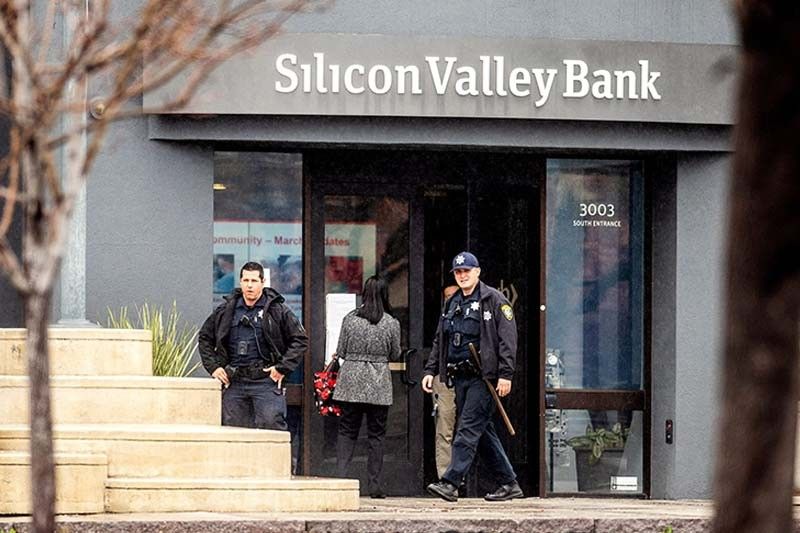US regulators rush to contain SVB fallout

As Biden vows to fix ‘mess’
WASHINGTON – US authorities unveiled sweeping measures Sunday to rescue depositors’ money in full from failed Silicon Valley Bank (SVB) and to promise other institutions help in meeting customers’ needs, as they announced a second tech-friendly bank had been closed by regulators.
With the two bank failures rattling nerves, President Joe Biden vowed to hold “fully accountable” the people responsible for “this mess” and said he would deliver remarks on Monday morning on maintaining a resilient banking system.
“The American people and American businesses can have confidence that their bank deposits will be there when they need them,” Biden said.
In a joint statement, financial agencies including the US Treasury said SVB depositors would have access to “all of their money” starting Monday, March 13, and that American taxpayers will not have to foot the bill.
The “core goal” of the moves was to reassure bank customers they would have their money “to meet payroll to keep their businesses operating, and to make sure households are able to pay the rent or the mortgage or any of their other bills,” US Federal Reserve officials told reporters Sunday night.
The Fed, the Federal Deposit Insurance Corp. (FDIC) and Treasury said in their statement that depositors in Signature Bank, a New York-based regional-size lender with significant cryptocurrency exposure, which was shuttered on Sunday after its stock price tanked, would also be “made whole.”
And in a potentially major development, the Fed announced it would make extra funding available to banks to help them meet the needs of depositors, which would include withdrawals.
“We are taking decisive actions to protect the US economy by strengthening public confidence in our banking system,” the agencies said.
“The US banking system remains resilient and on a solid foundation,” due in large part to reforms and banking industry safeguards undertaken after the financial crisis of 2008, they added.
“Those reforms combined with today’s actions demonstrate our commitment to take the necessary steps to ensure that depositors’ savings remain safe.”
The FDIC guarantees deposits – but only up to $250,000 per client and per bank.
Federal banking law, however, allows the FDIC to protect uninsured deposits if a failure to do so would pose systemic risks, the Washington Post reported.
Regulators on Friday took control of SVB – a key lender to startups across the United States since the 1980s – after a huge run on deposits left the medium-sized bank unable to stay afloat on its own.
Hours before Sunday’s joint statement, Treasury Secretary Janet Yellen said the government wants to avoid financial “contagion” from the SVB implosion, as it ruled out a bailout.
With the bank’s future, and its billions in deposits up in the air, officials from the three agencies raced to craft a solution just hours before financial markets opened in Asia, and to avert a potential financial panic.
Yellen told CBS that the US government wanted “to make sure that the troubles that exist at one bank don’t create contagion to others that are sound.”
Investors punished the banking sector in total on Thursday after SVB disclosed the extent of its troubles the day before, but by Friday, shares in some larger banks posted gains.
Amid concerns in Asia, Tokyo stocks opened lower Monday, with the benchmark Nikkei 225 index sliding 1.76 percent, while Hong Kong stocks opened slightly higher.
Since Friday, there have been calls from the tech and finance sectors for a bailout.
Yellen said reforms made after the 2008 financial crisis meant the government was not considering this option for SVB.
“During the financial crisis, there were investors and owners of systemic large banks that were bailed out... and the reforms that have been put in place means that we’re not going to do that again,” she said.
In their joint statement on the latest bank woes and efforts to protect depositors of SBV and Signature, the agencies stressed shareholders and certain unsecured debtholders will not be protected.
And Fed officials explained to reporters: “Investors in those two banks will lose everything. Senior management of those two banks will bear losses and be removed.”
Following the 2008 failure of Lehman Brothers and the ensuing financial meltdown, US regulators required major banks to hold additional capital in case of trouble.
US and European authorities also organize regular “stress tests” designed to uncover vulnerabilities at the largest banks.
- Latest
- Trending































